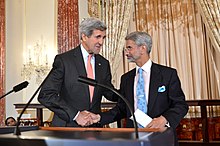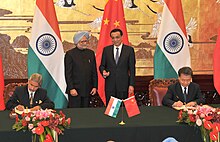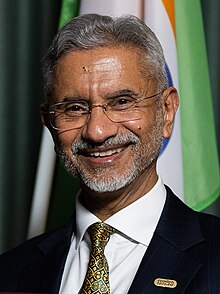
S. Jaishankar as Foreign Secretary (2015–2018): Strengthening India’s Diplomatic Footprint
Dr. Subrahmanyam Jaishankar, a seasoned diplomat with vast experience in international affairs, served as India’s Foreign Secretary from January 2015 to January 2018. His tenure was marked by a significant transformation in India’s foreign policy, emphasizing strategic partnerships, economic diplomacy, and global influence. He played a key role in advancing India’s diplomatic engagements, strengthening bilateral relations, and positioning India as a crucial player in global affairs.
Appointment and Background
Jaishankar, a 1977-batch Indian Foreign Service (IFS) officer, was appointed Foreign Secretary by the Modi government in January 2015, succeeding Sujatha Singh. His appointment was notable as it was an unprecedented decision to cut short the tenure of the incumbent Foreign Secretary. His deep expertise in Indo-US relations, China, and strategic affairs made him the preferred choice to lead India’s diplomatic corps.
Having previously served as Ambassador to China (2009–2013) and the United States (2013–2015), Jaishankar brought extensive experience in handling complex global relationships, particularly with major world powers.
Key Achievements as Foreign Secretary
1. Strengthening India-US Relations
Jaishankar played a pivotal role in deepening Indo-US strategic and defense ties. His previous tenure as India’s ambassador to the US had already solidified his reputation as an expert on US-India affairs. Some key developments during his tenure include:
- Operationalization of the India-US Civil Nuclear Deal: He was instrumental in resolving final hurdles in the nuclear agreement, ensuring the implementation of the landmark 2008 Indo-US Civil Nuclear Agreement.
- Expanding Defense Cooperation: He contributed to enhancing defense cooperation under the Defense Technology and Trade Initiative (DTTI), leading to increased defense technology transfers and joint military exercises.
- Bolstering Economic Ties: Bilateral trade between India and the US saw steady growth, with Jaishankar actively facilitating high-level economic engagements.
2. Managing India-China Relations
Jaishankar’s expertise on China was crucial in managing bilateral tensions and cooperation during a particularly delicate phase in India-China relations.
- Handling the Doklam Standoff (2017): One of the most significant events during his tenure was the Doklam crisis, a 73-day military standoff between India and China at the Bhutan-China-India tri-junction. His diplomatic acumen played a crucial role in diffusing tensions and preventing escalation into a full-blown conflict.
- Bilateral Dialogues: He facilitated high-level meetings between Indian and Chinese leadership to ensure continued diplomatic engagement and avoid future border conflicts.
3. Expansion of India’s Act East Policy
Jaishankar was instrumental in advancing India’s Act East Policy, which sought to enhance India’s strategic and economic ties with Southeast Asian and East Asian nations.
- Strengthening Ties with ASEAN: Under his leadership, India intensified engagement with ASEAN countries, promoting greater connectivity, trade, and maritime cooperation.
- India-Japan Relations: He played a key role in advancing the India-Japan Special Strategic Partnership, including cooperation on high-speed rail projects and defense collaboration.
- Improved India-Australia Relations: His tenure saw strengthened India-Australia relations, particularly in the areas of defense and energy cooperation.
4. India’s Engagement with the Gulf and Middle East
The Middle East and Gulf region became a major focus area for India’s diplomacy during Jaishankar’s tenure.
- Strengthening India-UAE Relations: The UAE became a crucial strategic partner, with enhanced cooperation in trade, energy security, and counterterrorism.
- Managing India-Saudi Arabia Ties: He worked towards securing India’s energy interests and deepening India-Saudi defense cooperation.
- Handling West Asia’s Volatile Geopolitics: His diplomatic efforts ensured that India balanced its relationships with Iran, Israel, and Arab nations effectively.
5. India’s Role in Global Organizations and Multilateral Engagements
During his tenure, Jaishankar ensured India played a more prominent role in global governance and multilateral forums.
- India’s Push for a Permanent UNSC Seat: He lobbied for India’s inclusion as a permanent member of the United Nations Security Council (UNSC), garnering support from various nations.
- Engagement with BRICS and SCO: India’s participation in BRICS and the Shanghai Cooperation Organization (SCO) increased, helping solidify India’s presence in Eurasian geopolitics.
- Paris Climate Agreement (2015): He played a role in ensuring India’s active participation in the Paris Climate Accord, aligning India’s commitments with its developmental goals.
6. Promoting Economic Diplomacy and Trade Agreements
Jaishankar emphasized the role of diplomacy in fostering economic growth through trade agreements and investment partnerships.
- Bilateral Trade Agreements: He facilitated multiple trade deals with the EU, Japan, ASEAN, and African nations to boost India’s exports.
- Attracting Foreign Investments: He supported government initiatives like ‘Make in India’, attracting investments from Japan, the US, and European nations.
- Engagement with African Nations: India deepened economic and diplomatic engagement with Africa through initiatives like the India-Africa Forum Summit.
7. India’s Neighborhood First Policy
Under Jaishankar’s leadership, India focused on strengthening ties with its immediate neighbors under the Neighborhood First Policy.
- Improved Relations with Bangladesh: He played a role in implementing the historic Land Boundary Agreement (LBA) of 2015, resolving a long-standing border dispute with Bangladesh.
- Engagement with Sri Lanka, Nepal, and Bhutan: His tenure saw India working closely with these countries on infrastructure projects, connectivity, and trade.
- Countering Chinese Influence: India strengthened its diplomatic and economic presence in South Asia to counter growing Chinese influence through the Belt and Road Initiative (BRI).
8. Strengthening Strategic Defense Alliances
Jaishankar’s tenure witnessed India forging stronger defense partnerships with key allies.
- India-Russia Defense Ties: He facilitated continued cooperation with Russia, including discussions on S-400 missile systems.
- Quad Engagement: He worked towards strengthening the Quad (India-US-Japan-Australia) strategic framework, reinforcing India’s Indo-Pacific vision.
- Maritime Security in the Indian Ocean: India expanded naval engagements and joint exercises with the US, France, and Australia.
Conclusion: A Transformational Tenure
Dr. S. Jaishankar’s tenure as Foreign Secretary (2015–2018) was a defining period for India’s diplomacy. His strategic vision, expertise in global geopolitics, and crisis management skills helped India navigate complex international challenges while advancing national interests. From managing China relations during the Doklam crisis to strengthening India-US ties and fostering regional partnerships, Jaishankar played a crucial role in elevating India’s global standing.
His leadership in shaping India’s foreign policy continues to influence India’s global engagements even beyond his tenure as Foreign Secretary, culminating in his appointment as External Affairs Minister in 2019. His contributions during this period laid the foundation for a more assertive and strategically positioned India in world affairs.
SOURCES: –




